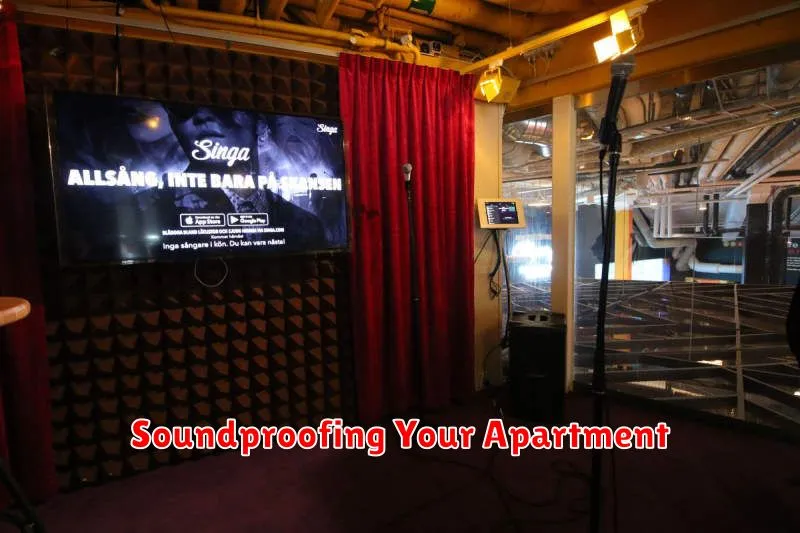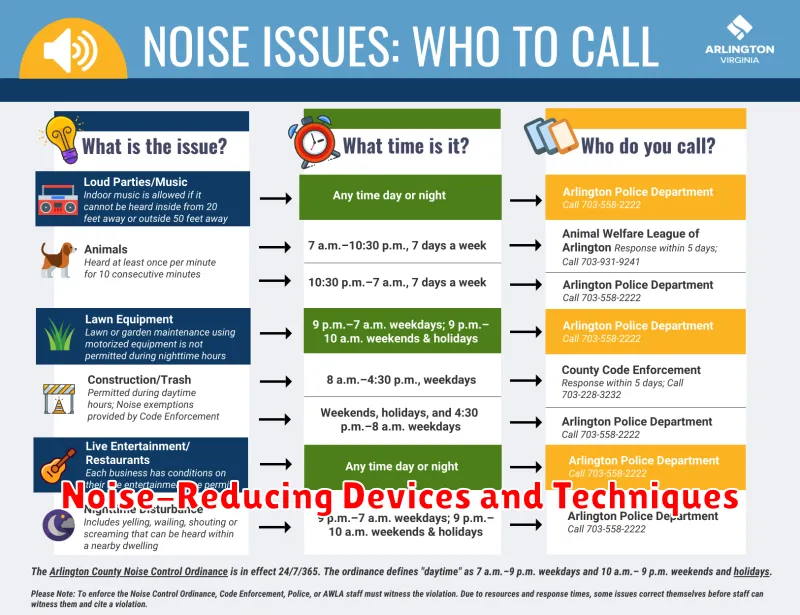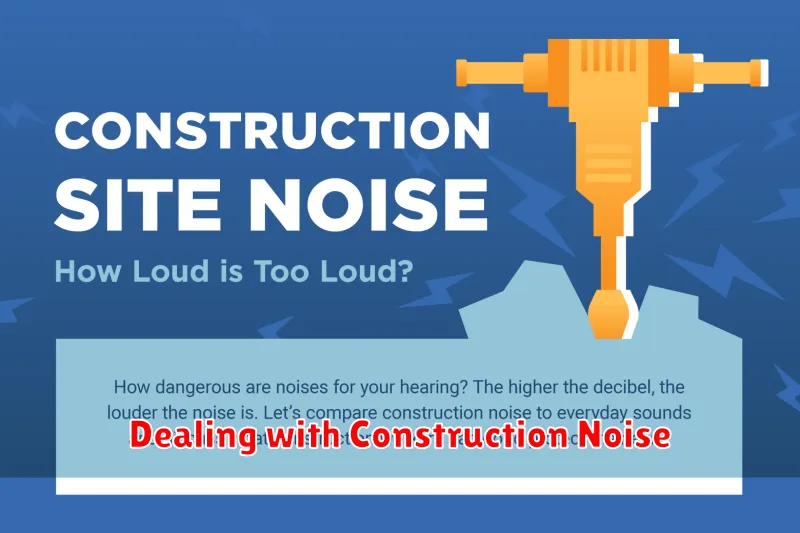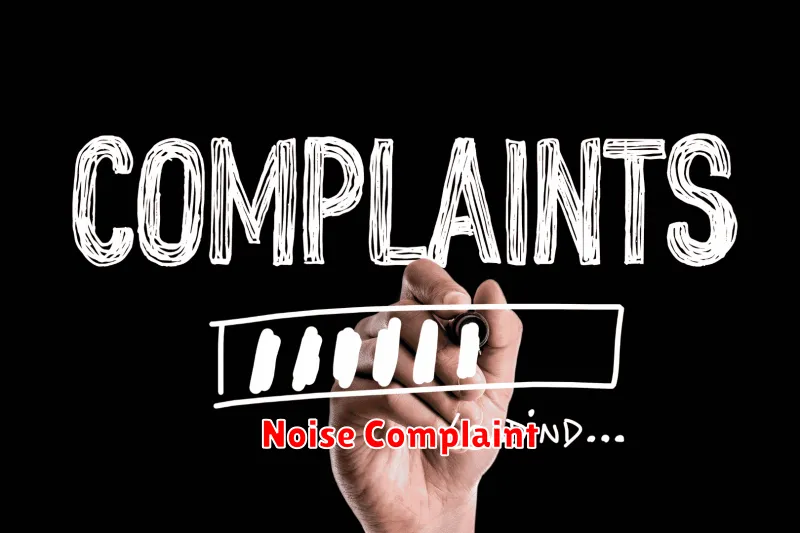Are you tired of loud neighbors keeping you up at night? Dealing with constant noise can be incredibly frustrating, impacting your sleep, peace of mind, and overall quality of life. But before you lose your cool, take a deep breath and remember that apartment noise complaints are a common occurrence. This guide will equip you with the knowledge and strategies to effectively address noise issues in your apartment building, ensuring a peaceful and harmonious living environment for all.
Identifying the Source of Noise
Before you can address noise complaints, you need to figure out where the noise is coming from. This may seem obvious, but sometimes the source is not immediately apparent. Start by paying attention to the time of day and frequency of the noise. Does it happen every day at a certain time? Is it louder on weekends? This can give you clues about the potential source.
Next, try to isolate the sound. Is it coming from above, below, or beside your unit? Can you hear it through the walls or the ceiling? Once you have a general idea of the source, you can start to investigate further. For example, if you suspect it’s coming from your upstairs neighbor, try listening at the ceiling to see if the noise is more pronounced there.
If you’re still unsure of the source, it’s always a good idea to talk to your neighbors. They may be able to offer some insights or even confirm your suspicions. Of course, be respectful and polite when doing so. You don’t want to accuse anyone before you have all the facts.
Communicating with Your Neighbors
When dealing with noise complaints in an apartment building, effective communication is key. Direct and respectful communication is crucial to finding a solution that works for everyone. Avoid confrontational language and aim to have a calm, open discussion.
Start by approaching your neighbor directly. Explain your concerns about the noise and try to understand their perspective. It’s possible they are unaware of the noise they are making or are willing to adjust their behavior.
If a direct approach doesn’t resolve the issue, consider involving the building management or landlord. They can mediate the situation and implement noise policies if necessary. Remember to document any instances of noise disturbance, including dates, times, and the specific sounds you hear. This documentation can be helpful if further action is needed.
Building a strong and respectful relationship with your neighbors is essential for a harmonious living environment. By communicating effectively, you can resolve noise issues and create a more peaceful apartment experience.
Contacting Your Landlord or Property Manager
If you’ve tried resolving the noise issue directly with your neighbor and it hasn’t worked, it’s time to involve your landlord or property manager. They’re responsible for maintaining a peaceful living environment for all tenants, and they have the authority to take action.
Before contacting your landlord, document everything. Keep a detailed record of the noise, including:
- Dates and times of the noise
- Duration of the noise
- Type of noise (music, loud voices, etc.)
- Frequency of the noise (daily, weekly, etc.)
- Attempts to resolve the issue with your neighbor
When you contact your landlord, be polite and professional. Clearly explain the situation, providing them with the information you’ve documented. Don’t accuse your neighbor or make any assumptions. Instead, focus on the impact the noise is having on your life.
Your landlord will likely investigate the situation. They may speak with your neighbor, send a written warning, or take other action. It’s important to be patient and give them time to address the issue. However, if the noise continues, don’t hesitate to follow up with your landlord.
Understanding Noise Ordinances
Living in an apartment building often means dealing with noise from your neighbors. While some noise is to be expected, excessive or disruptive noise can be a real nuisance. Most cities and towns have noise ordinances in place to regulate noise levels and protect residents from unreasonable disturbances. It’s important to understand these ordinances, as they can help you navigate noise complaints and resolve issues with your neighbors.
Noise ordinances typically define what constitutes excessive noise and specify permitted noise levels during different times of day. These ordinances often include provisions for:
- Loud music or amplified sound: This includes music played at high volumes, parties with amplified sound systems, and other loud activities.
- Construction noise: Many cities have specific rules about permitted construction hours and noise levels.
- Vehicle noise: Excessive engine revving, loud exhaust systems, and car alarms can be subject to noise ordinances.
- Yard work: Certain types of yard work, like mowing or power tools, may be restricted to specific times of day.
- Animal noise: Barking dogs or other loud animals can also be regulated by noise ordinances.
Noise ordinances often specify different noise limits for various times of day, such as:
- Daytime hours: These are typically less restrictive, allowing for higher noise levels.
- Evening hours: Noise limits are typically lower during the evening to ensure peace and quiet for residents.
- Nighttime hours: Noise levels are usually most restricted during the night to prevent disruption to sleep.
Penalties for violating noise ordinances can vary depending on the city or town and the severity of the violation. They may include:
- Warnings: A first offense may only result in a warning from law enforcement.
- Fines: Subsequent offenses may result in fines, which can increase for repeated violations.
- Court appearance: In some cases, serious or repeated violations may lead to a court appearance.
Understanding your local noise ordinances is crucial for resolving noise complaints and ensuring a peaceful living environment in your apartment building. It’s important to be aware of these regulations and to address noise issues appropriately to prevent escalation.
Documenting Noise Complaints
Documenting noise complaints is crucial for resolving the issue and protecting yourself. Detailed records provide evidence of the problem and help you build a case if further action is required. When documenting, aim for accuracy and objectivity. Include the date, time, duration, and specific type of noise. Describe the frequency of the noise, whether it’s occasional or persistent. Additionally, note the location within your apartment where the noise is most prominent.
Consider using a noise meter app to quantify the decibel level, providing a more objective measurement. Documenting noise complaints is important for a few reasons. First, it provides a clear record of the issue, which is helpful when communicating with your landlord or management company. Second, it helps to track the severity and frequency of the noise, which can be valuable if you need to escalate the issue. Finally, well-documented noise complaints can serve as evidence if you need to take legal action.
Keep a log of all your noise complaints, including the date, time, duration, and description of the noise. You can also use a journal or a spreadsheet to keep track of your complaints. Be sure to keep all of your documentation in a safe place. This will help you keep track of the noise issue and ensure you have a record of your efforts to resolve it.
Mediation and Resolution
If direct communication with your neighbor fails, consider seeking mediation. This could involve a third party, such as a building manager or a designated mediator, to facilitate communication and help find a resolution. Mediation offers a structured environment for both parties to express their concerns, explore potential solutions, and reach a mutually agreeable outcome. The mediator acts as a neutral facilitator, promoting understanding and compromise.
In some cases, a formal complaint may be necessary. This could involve filing a written complaint with your building management or landlord, detailing the nature of the noise disturbance and the attempts you’ve made to resolve it. Be sure to document the date, time, and specific type of noise in your complaint. If your landlord fails to take action, you might have recourse through local tenant laws or housing tribunals.
Legal Options for Noise Issues
If you’ve exhausted all other options for dealing with noise complaints, you may need to explore legal options. These options vary depending on your location and the severity of the noise issue. Here are some common legal avenues:
Contact your landlord: In many cases, the landlord is responsible for addressing noise issues. Your lease agreement may have specific clauses about noise and what constitutes a violation. You can submit a formal complaint to your landlord, documenting the dates, times, and nature of the noise.
Call the police: If the noise is disruptive, such as loud music or parties, you can contact the police. In many areas, there are noise ordinances that prohibit excessive noise during certain hours. Depending on the situation, the police may issue a warning or citation to the offending party.
File a lawsuit: In extreme cases, you may have grounds to file a lawsuit against your neighbor or landlord. This should be considered as a last resort, as it can be time-consuming and costly. However, if the noise is severe, ongoing, and causing you significant distress, a lawsuit may be necessary to obtain a court order to stop the noise.
Consider mediation: Before pursuing legal action, it might be helpful to consider mediation. A neutral third party can help facilitate communication between you and your neighbor, leading to a mutually agreeable solution. This can be a less adversarial and potentially more effective approach.
It’s important to remember that legal options should be explored carefully and with the guidance of an attorney. They can advise you on the best course of action and help you understand your rights and options. Additionally, documenting the noise issue with dates, times, and descriptions can be valuable evidence if legal action is necessary.
Soundproofing Your Apartment

Dealing with noise from neighbors can be incredibly frustrating. If you’ve tried talking to your neighbors and it hasn’t worked, you may be considering soundproofing your apartment. While it may not be possible to completely eliminate all noise, there are a few things you can do to make your apartment more soundproof.
One of the most effective ways to soundproof your apartment is to add sound-absorbing materials. This could include adding thick curtains or drapes to your windows, hanging acoustic panels on your walls, or laying down thick rugs on your floors. These materials will help to absorb sound waves, preventing them from traveling through your apartment and reaching your ears.
You can also improve your apartment’s soundproofing by sealing any cracks or gaps in your walls, doors, and windows. This will help to prevent noise from traveling through these openings. You can use caulk, weatherstripping, or even acoustic sealant to seal these gaps.
Finally, you can also try to reduce the noise level in your own apartment. This could involve using a white noise machine to mask the sound of your neighbors, playing music or television at a low volume, or simply trying to be more mindful of the noise you make.
While soundproofing your apartment may not completely eliminate all noise, it can significantly reduce the amount of noise you hear. This can make your apartment a more peaceful and enjoyable place to live.
Noise-Reducing Devices and Techniques

If you’re experiencing persistent noise problems in your apartment, consider implementing noise-reducing devices and techniques to create a more peaceful environment. These solutions can help dampen sound and minimize distractions, whether it’s coming from your neighbors, traffic, or other sources.
White noise machines are excellent for masking unwanted sounds. They emit soothing, consistent sounds like rain, ocean waves, or fan static, effectively drowning out distracting noises. You can find white noise machines in various forms, including standalone devices, apps, and even smart speakers.
Sound-dampening curtains or blinds can significantly reduce noise levels by absorbing sound waves. Thick, heavy curtains made of materials like velvet or blackout fabric are particularly effective. These curtains can also help regulate temperature and provide privacy.
Area rugs can help absorb sound and reduce noise transmission throughout your apartment. Choose rugs with thick pile and dense materials for optimal noise reduction.
Sound-absorbing panels are excellent for treating specific areas where noise is prevalent. You can install them on walls, ceilings, or even furniture. These panels are typically made of acoustical foam or other sound-absorbing materials.
Acoustic foam is a versatile material that can be used to create DIY noise-reducing solutions. It can be easily attached to walls, ceilings, and furniture. While acoustic foam may not completely eliminate noise, it can significantly reduce echoes and reverberations within your apartment.
By implementing these noise-reducing devices and techniques, you can effectively minimize noise levels and create a more peaceful living space. Remember to choose solutions that best suit your individual needs and preferences.
Dealing with Construction Noise

Construction noise can be a major nuisance, especially in an apartment building. If you’re dealing with construction noise in your apartment, it’s important to take action to minimize the impact on your life. Here are some tips:
Communicate with your landlord or building management. They should be aware of the construction and may be able to provide you with information about the schedule and duration of the work. You may also be able to request that they implement noise mitigation measures, such as using soundproofing materials or scheduling work during specific times.
Document the noise. Keep a record of the times and dates of the noise, as well as any specific details about the noise, such as the type of equipment being used or the frequency of the noise. This documentation can be helpful if you need to escalate your complaint.
Consider using noise-dampening techniques. There are a number of things you can do to reduce the noise levels in your apartment, such as using earplugs, white noise machines, or sound-absorbing curtains.
Be patient. Construction projects can take a long time to complete. It’s important to remember that the noise is likely temporary and will eventually subside. If you are dealing with particularly disruptive noise, you may need to be persistent in your efforts to resolve the issue.
Addressing Noise from Parties and Gatherings

Parties and gatherings can be a source of significant noise in apartment buildings. When dealing with noise complaints related to these events, it’s essential to approach the situation calmly and respectfully. Here are some tips to address noise from parties and gatherings in your apartment complex:
Communicate with the Neighbors: If the noise is excessive and disruptive, consider approaching your neighbors directly. Explain how the noise is affecting you and kindly request them to lower the volume or move the party indoors. Choose a time when you can speak to them calmly and respectfully.
Document the Noise: Keep a record of the dates, times, and duration of the noise. This will help strengthen your case if you need to file a formal complaint with your landlord or building management.
Contact Your Landlord or Building Management: If direct communication with your neighbor fails to resolve the issue, contact your landlord or building management. Provide them with the documentation you’ve collected and explain the situation. They may have a noise policy in place or can intervene on your behalf.
Consider Noise Reduction Techniques: If you can’t control the source of the noise, consider ways to reduce the noise in your own apartment. Using white noise machines, earplugs, or sound-dampening curtains can help block out external noise.
Remember, maintaining a peaceful and harmonious living environment is crucial for all residents. By following these tips, you can effectively address noise from parties and gatherings and work towards a more peaceful living situation.

